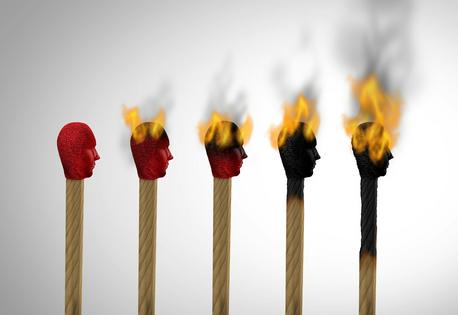A nation exhausted: The neuroscience of why Americans are tuning out politics
Published in Political News
“I am definitely not following the news anymore,” one patient told me when I asked about her political news consumption in the weeks before the 2024 U.S. presidential election.
This conversation happened around the time I talked with a local TV channel about why we saw fewer political yard signs during this year’s election season, compared with past ones.
I am a psychiatrist who studies and treats fear and anxiety. One of my main mental health recommendations to my patients during the 2016 and 2020 election cycles was to reduce their political news consumption. I also tried to convince them that the five hours a day they spent watching cable news was only leaving them helpless and terrified.
Over the past couple of years, though, I have noticed a change: Many of my patients say they either have tuned out or are too exhausted to do more than a brief read of political news or watch one hour of their favorite political show.
Research supports my clinical experience: A Pew research study from 2020 showed that 66% of Americans were worn out by political stress. Interestingly, those who are not following the news feel that same news fatigue at an even higher percentage of 73%. In 2023, 8 out of 10 Americans described U.S. politics with negative words like “divisive,” “corrupt,” “messy” and “polarized.”
In my view, three major factors have led Americans to exhaustion and burnout with U.S politics.
In my 2023 book, “AFRAID: Understanding the Purpose of Fear, and Harnessing the Power of Anxiety,” I discuss how American politicians and major news media have found an ally in fear: a very strong emotion that can be used to grab our attention, keeping us in the tribal dividing lines and making us follow, click, tap, watch and donate.
Over the past few decades, many people have felt a strong push for tribalism, an “us vs. them” way of seeing the world, turning Americans against one another. This has led to a point where we are not just in disagreement with each other. We hate, cancel, block and attack those who disagree with us.
It can feel like Fox News and MSNBC commentators are talking about Americas from two different planets. The same is true when it comes to different social media feeds.
Many people are part of social media communities that are closed to the world outside their homes and familiar social circles. Based on people’s political views and what they search for or watch and read, social media algorithms feed them content where everybody talks and thinks alike. If you hear about the other side, it is only about their worst attributes and behavior.
The disconnect is so wide that people are not even able to comprehend the thinking of those from other perspectives and find their logic or political beliefs unfathomable.
Many Americans have gotten to the point of believing that the other half of Americans are, at best, unintelligent and stupid; and at worst, immoral and evil.
There was a time in American politics where two politicians or two neighbors could disagree, but still believe that the other person was fundamentally good.
Over time, and more so since the early 2000s, this ability to connect despite political beliefs has decreased.
The majority of both Democrats and Republicans said in a 2022 Pew Research survey that someone’s political ideas are an indicator of their morality and character.
This 2022 Pew survey also shows that partisan animosity extends to judgments about character: 72% of Republicans and 63% of Democrats said they believe members of the opposing party are more “immoral” than other Americans.
This is evident in day-to-day conversations of members of both political tribes: “How can I be friends with someone who wants to kill babies,” or “How can I talk to someone who is OK with women dying in a corner of a clinic parking lot”. We can no longer see someone’s political affiliation in the context of their humanity at large.
Fear as a deeply ingrained survival mechanism takes priority over other brain functions.
Fear guides your memories, feelings, attention and thoughts, and can cause you to keep watching, scrolling and reading to monitor this perceived threat. Positive or neutral news could then become uninteresting because it is not important in your survival response. That has been the key to a person’s deep engagement with the fear-based political news.
But too much fear does not keep someone engaged forever. That is because of another survival mechanism – what’s called “learned helplessness.”
In 1967, American psychologist Martin Seligman exposed two groups of dogs to painful shocks. Dogs in group 1 could stop the shock by pressing a lever, which they quickly learned to do. But the dogs in group 2 learned that they could not control when the shock starts and stops.
Then, both groups were placed in a box divided into two halves by a small barrier, and shock was applied to only one side of the box. Dogs in group 1 – who had learned how to stop the shocks in the earlier experiment – quickly learned to jump over the barrier to the shock-free side. But dogs in group 2 did not even attempt to do so. They had learned there is no point in trying.
This experiment has been replicated in different forms with other animals and humans with the same conclusion: When people feel they cannot control the painful or scary situation, they just give up. During such experiences, the brain’s fear region – called the amygdala – is hyperactive. Meanwhile, emotion-regulating brain areas like the prefrontal cortex decrease in activity under these circumstances.
Learned helplessness also means the brain mechanisms commonly involved in regulating anxiety and depression don’t function as well.
When working with patients who have suffered from long periods of intense anxiety, fear, trauma and exhaustion, I see learned helplessness showing up in the form of depression, loss of motivation, fatigue and lack of engagement with the world around them.
The COVID-19 pandemic, more than a decade of intense political stress, polarizing social media and wars across the world, as well as public disillusionment with U.S. politics and media, have led, I believe, to many people experiencing burnout and learned helplessness.
If you feel politically exhausted, you are not the problem. Feel free to tune out from the noise.
This article is republished from The Conversation, a nonprofit, independent news organization bringing you facts and trustworthy analysis to help you make sense of our complex world. It was written by: Arash Javanbakht, Wayne State University
Read more:
Polarization may phase out of American politics as younger generations shift into power
Trust in U.S. media hit an all-time low in 2024 − a new survey shows Black midwesterners have found other trusted messengers of news
Stop and think: An undervalued approach in a world that short-circuits thoughtful political judgment
Arash Javanbakht does not work for, consult, own shares in or receive funding from any company or organization that would benefit from this article, and has disclosed no relevant affiliations beyond their academic appointment.


































































Comments